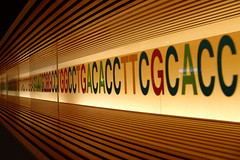 A study has revealed that there are four gene variants that are involved in the brain signaling pathways in some children who have ADHD. This finding could, potentially, be used to help create medications that target those specific pathways. It could also lead to new treatments for kids who have ADHD due to those specific gene variants.
A study has revealed that there are four gene variants that are involved in the brain signaling pathways in some children who have ADHD. This finding could, potentially, be used to help create medications that target those specific pathways. It could also lead to new treatments for kids who have ADHD due to those specific gene variants.
Researchers from the Center for Applied Genomics at the Children’s Hospital of Philadelphia have discovered that there are four gene variants that affect a sub-set of children that have ADHD. All four gene variants are part of the glutamate receptor gene family. The genes appear to be involved in important brain signaling pathways.
The researchers did a study that included 1,000 children who had ADHD. The children involved in the study were selected from a database at the Children’s Hospital of Philadelphia. This group of kids was compared with the 4,100 other kids who did not have ADHD.
In other words, the group of kids who had ADHD was compared with a “control group” who didn’t have it. All the children in the study were around the same age. All of the kids, in each group, had a whole-genome analyses done. All of the kids in the study were Caucasian.
As a result, the researchers found that there are four genes that had a larger number of copy number variations (CNVs) in the group of kids who had ADHD. All of the gene variants were on glutamate receptor (GMR) genes. Glutamate is an amino acid, and it helps to transmit signals between brain neurons.
The Center For Disease Control’s National Center for Health Statistics did a survey that found that one out of every ten children in the United States has ADHD. It has been known for quite some time that ADHD runs in families, but the exact reasons why have not entirely been discovered.
The new research, that identifies four genes that are linked to ADHD, (in some of the children who have the disorder), is significant. There is potential that pharmaceutical companies could use this information to target those specifically affected pathways, in an effort to create a more effective medication to help alleviate the symptoms of ADHD.
Currently, there are many families who have children that have ADHD who are having difficulties obtaining the ADHD medication that their child needs. Perhaps this study could influence pharmaceutical companies to create brand new medications, that would not run into the same distribution constraints, or problems with shortages, as the current ones do.
Image by MIKI Yoshihito on Flickr

